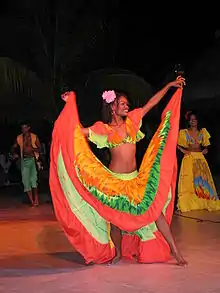Women in Mauritius
 Two female Sega music dancers (center and right) from Mauritius. | |
| Gender Inequality Index | |
|---|---|
| Value | 0.375 (2013) |
| Rank | 63rd |
| Maternal mortality (per 100,000) | 53 (2020) |
| Women in parliament | 20% (2029 |
| Females over 25 with secondary education | 45.2% (2010) |
| Women in labour force | 50% (2018) |
| Global Gender Gap Index[1] | |
| Value | 0.663 (2018) |
| Rank | 109th out of 153 |
| Part of a series on |
| Women in society |
|---|
 |
Workforce
As in other industrializing countries, the role of women in Mauritius is changing rapidly. A major force for change has been the rapid influx of women into the many jobs created in the 1980s in the export processing zones. Although low-paying for the most part, the jobs allow women formerly confined to the roles of mother and wife to gain a certain degree of personal and social freedom. In 2008, Mauritius established the Employment Rights Act which forbids any form of discrimination within the workplace and stipulates equal remuneration for work of equal value.[2] Under this act and the Civil Code, both females and males, regardless of their marital status, have the legal right to choose their own profession [3]
Parliament
In the postcolonial era, women in Mauritius saw great difficulty in gaining positions of power. Mauritius' culture was founded upon the British colonial model until their independence that modelled their society on a male hegemony at all levels of its structure.[4] During the 19th-century Mauritian law stated that women should be treated as the inalienable property of their husbands [5] The government has taken measures to promote equality of the sexes by repealing discriminatory laws dealing with inheritance and emigration. In 1989 the government appointed equal opportunity officers in the principal ministries to deal with women's issues. Reports by the Ministry of Women's Rights and Family Welfare and others indicate, however, that violence against women is prevalent. The increased employment of women has created the need for more child-care services and for more laborsaving devices in the home. The Domestic Violence Act has given protection to domestic violence victims and has helped women in issues with inheritance and emigration.[6]
Today, women in Mauritius are more independent than they used to be some 30 years ago. Mauritius also has got its first Lady President, Mrs Ameena Gurib-Fakhim and the first Lady Speaker, Hon.Mrs Maya Hanoomanjee, in 2014.
Events
In 2016, the Ministry of Gender Equality requested the withdrawal of an advertisement by Coca-Cola which was considered "sexist" following a complaint from a gender consultant. In March 2018, a new law was established to form the National Women’s Council as a platform for women to voice out their needs and aspirations.[7] In order to address issues like violence against women, trafficking of women, and the promotion and protection of rights to sexuality and sexual and reproductive health, in May 2018, a joint monitoring framework agreement on the gender action plan was signed with the European Union.[8]
Quantitative Indicators
Economic
In Mauritius, working age females (15+) have an unemployment rate of 10%.[9] The proportion of women in the most senior positions (Senior Chief Executive, Permanent Secretary, Deputy Permanent Secretary, Director, Manager, Judge and Magistrate) increased from 23% in 2001 to 40% in 2016. The international conference in August 2018, created a declaration on women’s economic empowerment and a work plan on the priority areas of the Indian Rim Association to significantly contribute to women’s economic empowerment.[10]
Education
The proportion of students progressing from primary cycle to secondary cycle in 2011 was 79% for boys and 84% for girls. Girls are outperforming boys at higher school level.[11]
Gender
In 2013, Mauritius' Gender Inequality Index was 0.375.[12] Ms. Jeewa-Daureeawoo states that despite the challenges and constraints, Mauritius is on the way to distinguishing discrimination against women.[13]
Further indicators ca
- "The Global Gender Gap Report 2018" (PDF). World Economic Forum. pp. 10–11.
- "Mauritius" (PDF). OECD DEVELOPMENT CENTRE. 2019.
- "Mauritius" (PDF). 2019.
- Vlcek, William (2019-01-02). "The Mauritian Paradox: Fifty Years of Development, Diversity and Democracy". The Round Table. 108 (1): 104–106. doi:10.1080/00358533.2019.1565351. ISSN 0035-8533.
- Ramtohul, Ramola (2020-07-30). "Women in Mauritius". Oxford Research Encyclopedia of African History. doi:10.1093/acrefore/9780190277734.001.0001/acrefore-9780190277734-e-528. Retrieved 2020-10-27.
- Calder, Angus (2003). "A man for all cultures: the careers of learie constantine". Culture, Sport, Society. 6 (1): 19–42. doi:10.1080/14610980312331271469. ISSN 1461-0981.
- "OHCHR | Committee on the Elimination of Discrimination against Women reviews the report of Mauritius". www.ohchr.org. Retrieved 2020-10-27.
- "OHCHR | Committee on the Elimination of Discrimination against Women reviews the report of Mauritius". www.ohchr.org. Retrieved 2020-10-27.
- UN Women (2020). "Mauritius". UN Women - Women Count.
- "OHCHR | Committee on the Elimination of Discrimination against Women reviews the report of Mauritius". www.ohchr.org. Retrieved 2020-10-27.
- DefiMedia (2016). "Pub de Coca-Cola : le ministère de l'Égalité des genres fait marche arrière". Le Defi Media Group (in French). Retrieved 2020-10-27.
- UNDP (2020). "Gender Inequality Index". UNITED NATIONS DEVELOPMENT PROGRAMME -Human Development Reports.
- "OHCHR | Committee on the Elimination of Discrimination against Women reviews the report of Mauritius". www.ohchr.org. Retrieved 2020-10-27.
External links
| Wikimedia Commons has media related to Women of Mauritius. |
.svg.png.webp)